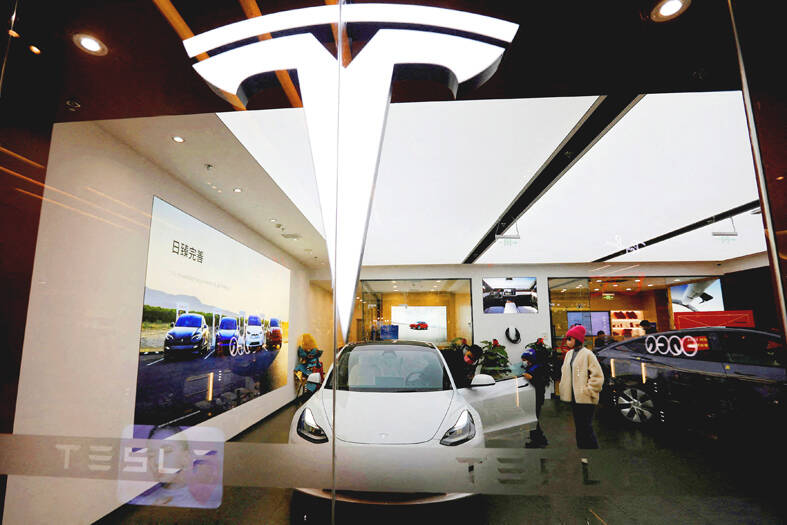Tesla Inc cut prices in China and the US, its two key markets, after disappointing first quarter sales contributed to swelling inventory.
In China, Tesla lowered prices across its range, with the revamped Model 3 falling to 231,900 yuan (US$32,659) from 245,900 yuan previously. The Model Y was discounted to 249,900 yuan from 263,900 yuan.
In the US, the cheapest version of the Model Y is US$42,990, back to the sports utility vehicle’s lowest starting price.

Photo: REUTERS
Tesla also discounted the two other more expensive versions of the Model Y by US$2,000, and dropped the price of the Model X to its lowest yet.
The cuts cap a wild week for the Texas-based automaker, even by Tesla CEO Elon Musk’s standards.
It started when Musk announced in a memo to the company’s more than 140,000 employees that he was reducing headcount by more than 10 percent globally. Two top executives also left.
Tesla is to ask shareholders to vote again on a US$56 billion compensation for Musk that was voided by a Delaware court in January, the company said on Wednesday in its proxy statement.
On Friday, the company recalled almost 3,900 Cybertruck pickup trucks to fix or replace accelerator pedals that could dislodge and cause the vehicle to unintentionally accelerate, increasing the risk of a crash.
Then on Saturday, Musk postponed a planned trip to India, where he was expected to meet with Indian Prime Minister Narendra Modi, saying he had to deal with “heavy obligations” at Tesla.
Tesla is to report its first-quarter earnings tomorrow.
Its stock is down more than 40 percent this year on concern about slumping sales, intensifying competition in China and Musk’s risky plan to go “balls to the wall” on autonomy.
The automaker reported its first year-on-year sales drop since the early days of the COVID-19 pandemic, delivering 386,810 vehicles in the first quarter, well short of analyst estimates.
In China, Tesla’s market share shrank to about 6.7 percent in the fourth quarter of last year, from 10.5 percent in the first three months of the year, Bloomberg calculations based on China Passenger Car Association data showed.
The automaker recently pared back production schedules at its Shanghai factory, Bloomberg said late last month.
Shipments from its Shanghai plant — which makes electric vehicles for China and for export to other parts of Asia, Europe and Canada — declined in the first two months from a year earlier, even as overall passenger vehicle sales in China increased.

RUN IT BACK: A succesful first project working with hyperscalers to design chips encouraged MediaTek to start a second project, aiming to hit stride in 2028 MediaTek Inc (聯發科), the world’s biggest smartphone chip supplier, yesterday said it is engaging a second hyperscaler to help design artificial intelligence (AI) accelerators used in data centers following a similar project expected to generate revenue streams soon. The first AI accelerator project is to bring in US$1 billion revenue next year and several billion US dollars more in 2027, MediaTek chief executive officer Rick Tsai (蔡力行) told a virtual investor conference yesterday. The second AI accelerator project is expected to contribute to revenue beginning in 2028, Tsai said. MediaTek yesterday raised its revenue forecast for the global AI accelerator used

Taiwan Semiconductor Manufacturing Co (TSMC, 台積電) has secured three construction permits for its plan to build a state-of-the-art A14 wafer fab in Taichung, and is likely to start construction soon, the Central Taiwan Science Park Bureau said yesterday. Speaking with CNA, Wang Chun-chieh (王俊傑), deputy director general of the science park bureau, said the world’s largest contract chipmaker has received three construction permits — one to build a fab to roll out sophisticated chips, another to build a central utility plant to provide water and electricity for the facility and the other to build three office buildings. With the three permits, TSMC

TEMPORARY TRUCE: China has made concessions to ease rare earth trade controls, among others, while Washington holds fire on a 100% tariff on all Chinese goods China is effectively suspending implementation of additional export controls on rare earth metals and terminating investigations targeting US companies in the semiconductor supply chain, the White House announced. The White House on Saturday issued a fact sheet outlining some details of the trade pact agreed to earlier in the week by US President Donald Trump and Chinese President Xi Jinping (習近平) that aimed to ease tensions between the world’s two largest economies. Under the deal, China is to issue general licenses valid for exports of rare earths, gallium, germanium, antimony and graphite “for the benefit of US end users and their suppliers

Dutch chipmaker Nexperia BV’s China unit yesterday said that it had established sufficient inventories of finished goods and works-in-progress, and that its supply chain remained secure and stable after its parent halted wafer supplies. The Dutch company suspended supplies of wafers to its Chinese assembly plant a week ago, calling it “a direct consequence of the local management’s recent failure to comply with the agreed contractual payment terms,” Reuters reported on Friday last week. Its China unit called Nexperia’s suspension “unilateral” and “extremely irresponsible,” adding that the Dutch parent’s claim about contractual payment was “misleading and highly deceptive,” according to a statement